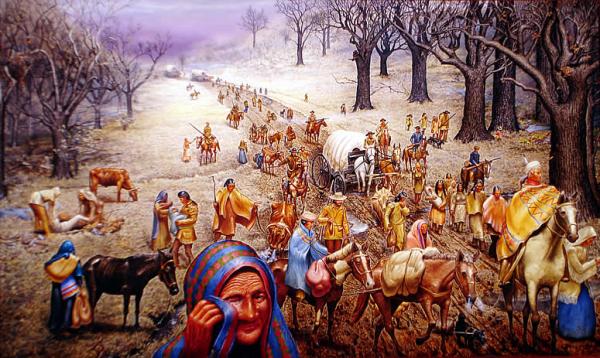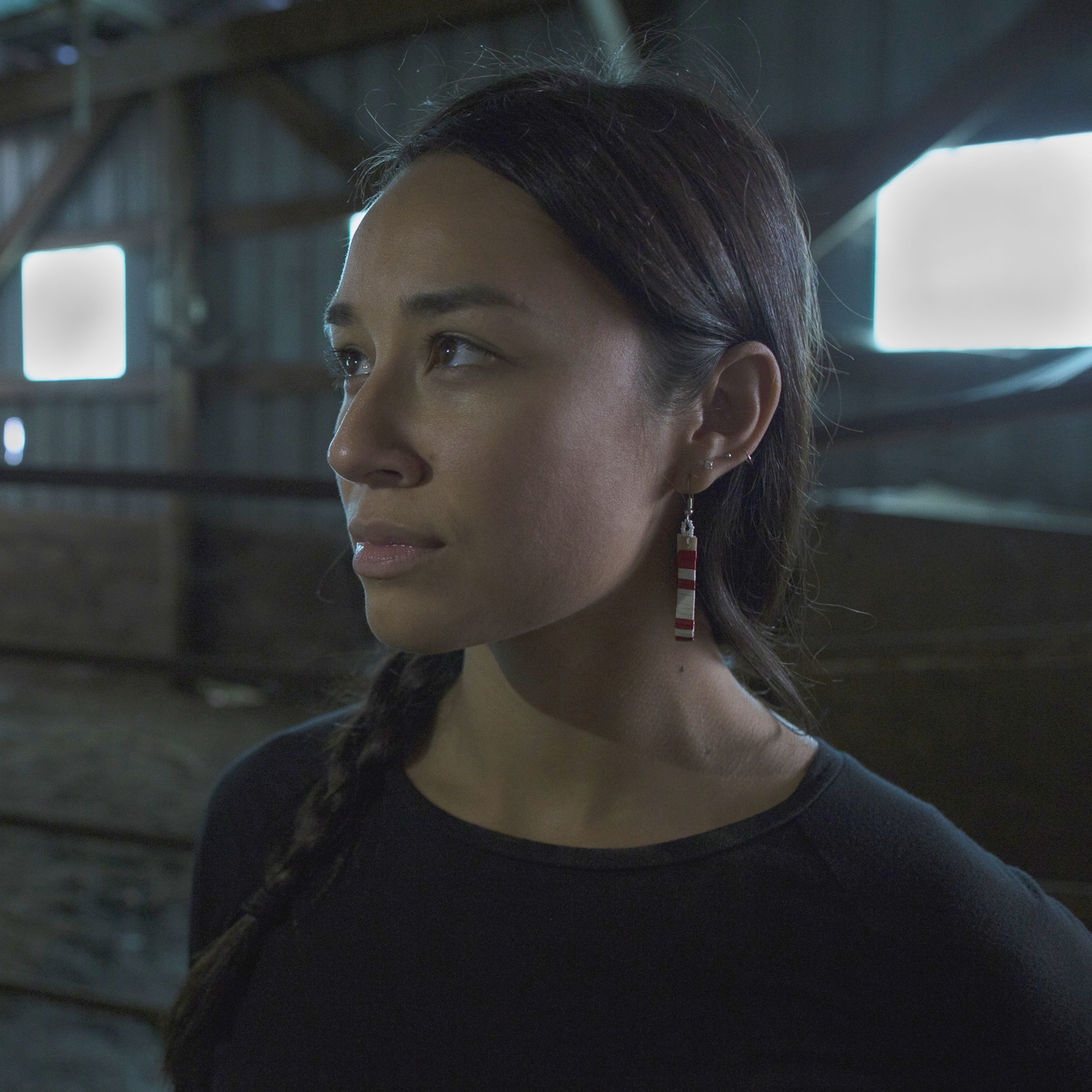International Crises: Remembering Our Past, Sharing Their Present

"I discovered that a person can or will die of loneliness if he or she is removed from his or her land... After I relocated I kept dreaming of walking along the land that I left; this haunted me continually. Thus, I came to realize, the same land that I left was grieving me to death." Ė Dineí relocatee
Compassion is power.
People the world over are hurting. Native people have the power understand and share their grief in a profound way. This isnít about politics, this isnít about votes, and this isnít about money. This is about energy. This is about feelings. This is about prayers. These are things that matter more than we can ever know.
Citing the Jewish Holocaust is the go-to for mainstream (white) American media in efforts to evoke empathy and offer context to contemporary tragedies. We care about it because we know about itÖ as we should.
I am grateful that at least one devastating, genocidal, unthinkable tragedy in world history is widely recognized and capable of evoking immediate sympathy from the average Joe. Most of us recognize this event as an unquestionable wrong; A glaring misstep in human history... as we should.
Native people are even more capable than the average American of drawing from history to apply sympathy and empathy to todayís tragedies. This is a good thing. It shows dignity. Even though the average Joe doesnít know the half of what our people went through, we know and we care, and this helps us to care about othersÖ as we should.
When Donald Trump presented the idea of surveilling American Muslim places of worship, using a database to track American Muslims, and forcing them to carry a special ID - as if they are some sort of imminent danger - the American media promptly drew the comparison between that and what Hitler once executed: the concentration camp tattoos and Stars of David sewn onto Jewish jackets to promote discrimination and mistreatment of them at the timeÖ a valid point of comparison.
Native people might have thought of another system: early tribal enrollment and the CDIB cards that we still carry and the uncomfortable fact that to this day, the government measures our blood like they measure that of a horse, all with the intention of ultimately destroying our communities by breeding us out. As a survival tactic and making the most of the circumstances, weíve since coopted this system and choose to keep it. But remember that at one time it wasnít our choice. Remember that ultimately, itís a bureaucratic means of suppressing our freedoms.
Regarding international crises, letís use our knowledge to make more comparisons. Letís try to understand this situation further than the average Joe. Letís think about our own history in relation to what people around the world are experiencing right now.

First, Syria.
When conservatives talk about the Syrian refugees as though they are terrorists, as though their lives donít matter, as though they are less than human, letís recognize the error in that.
So far, 4.2 million Syrian people have fled their homes due to violence, terror, and fear of the religious extremists who are attacking them on their land. Hear that and think of the Trail of Tears (1830-1850), the Long Walk (1864-1866), and the displacement of the Yavapai Apache from Camp Verde to San Carlos (1875). These are incidents in which thousands of Native people were violently removed from their homes, fleeing an invading force of religious zealots and extremists who cared nothing for Native lives. Think of the men, women, little ones and elders who had to endure these painful experiences. Think of their families, their babies, their children, who trudged for miles and miles in harsh weather with insufficient food and shelter. Think of how they didnít deserve it. Think of how grateful we are that some survived. But also, think of those who died. Three quarters of Syrian refugees are women and children. So far, only about 2,000 have been admitted to the United States after passing extremely rigorous security screenings. Instead of agreeing with the lies you are hearing about these innocent people posing a threat, think of our history and learn from it. Feel for them.
Next, Nigeria.
Boko Haram is a terrorist organization that is ranked more threatening than ISIS. They are terrorizing the people of Nigeria by attacking, murdering, raping and kidnapping schoolchildren, women, and other innocents. Hear this and think of boarding schools and residential schools. Think of forced removal of Native children from their homes. Think of missing and murdered Indigenous women. Think of the terror that our people have been through and continue to face. Instead of ignoring or undermining the severity of the situation in Nigeria, learn more about it. Recognize their pain and relate to their experiences. Offer sympathy as you do for Paris or 9/11 or victims of the KKK. Feel for them.
Finally, Islam.
When people tell you that all Muslims are evil or that their beliefs are rooted in terrorism, think of the fact that until the American Indian Religious Freedom Act of 1978, Native peoplesí beliefs were also considered a threat to national security. Medicine men and altruistic leaders of the people, like Wovoka, were considered public enemy number one. Our ceremonies were outlawed. We were viewed as heathens, as savages, as less than human. Nobody understood our sacrifices. They did not care to learn about our ways. Many still view us this way. The same thing is happening to peaceful Muslim people all over the world today. Instead of going with the flow of discriminatory judgement, learn the truth. Feel for them.
Native people have been through a lot, and this shared history of violence has led us to a place in which we are uniquely capable of thinking about these contemporary tragedies with open hearts. We can think of forced removal, of reservation confinement, of a welfare state, of government wrongdoing, of cultural misunderstanding, of outsiders villainizing our ceremonies and religions. We can think of these things and do as we have been taught - to relate, to recognize similarities over differences, and to hope for the safety and security of those who need it most.
Donald Trump says that he has not cried since he was a baby. How can a man who does not cry - who has no compassion or emotion for anything - claim to be fit to ascend to the position of leader of the free world? How do we believe his claim that he is interested in protecting American lives? How can he care about American lives if he does not have the capacity to feel for others?
Say what you will about Barack Obama, but it is undeniable that when you look into his eyes while he talks about tragedies abroad and human suffering, you can see that he cares. He is a human who recognizes the humanity in all people - not just in white Americans. He is a leader who recognizes that compassion is worth more than gold. He recognizes that upholding American values and keeping Americans safe requires cooperation and respectful interaction with rest of the world.
The historical trauma that Native people have experienced lends itself to a nuanced understanding of the world. Our strong sense of community and family values allow us the capacity for deep and true sympathy for those who need it. Do not waste that gift.
Do not remain complacent or ignorant regarding tragedies the world over. The information is out there. We know that Syrians are not terrorists. We know that people who are fleeing violence deserve a chance at life. We know that we should support these families who are experiencing these unthinkable tragedies.
Remember our history while contributing to the rhetoric that advocates for more humane treatment of our international brothers and sisters. We live in this ever-globalizing world and we must be citizens of it. Not just of America, not just of our Tribal nations, but of the world.
We are all human. We are all related. And so, recognize the humanity in others. At the very least, think of them.

Read more at http://indiancountrytodaymedianetwork.com/2015/11/27/international-crises-remembering-our-past-sharing-their-present-162586